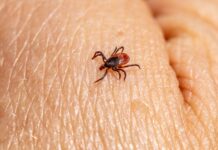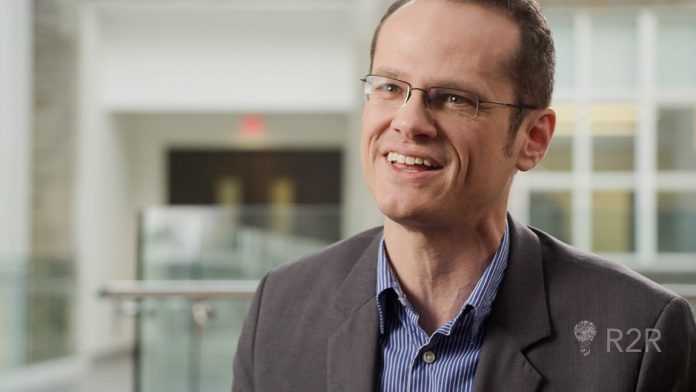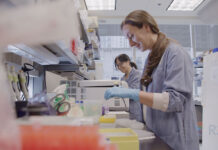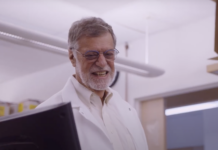Mark Daley is a Professor of Computer Science, Biology, and Statistics & Actuarial Science at the Brain and Mind Institute at Western University. We asked everything from why he chose his field of study to what’s on his playlist in hopes of giving you a better understanding of what goes on outside the lab for one of the best minds in Canadian research.
What inspired you to become a scientist?
I grew up in a household where science was venerated, passionate dinnertime debates were actively encouraged and where I always felt a sense of wonder about the world.
That said, when I left high school the first thing I studied was actually composition at the Berklee School of Music. I realized that while I deeply loved music, I really missed science… and so I ran away from music school to become a mathematician.
What do you like most about being a scientist?
The teamwork. The era of the lone genius is almost behind us (a few remain, especially in fields like pure maths… but even there, the tides are changing). Significant new breakthroughs are increasingly becoming the preserve of broadly transdisciplinary teams. The feeling of being in a room with a group of fiercely intelligent, passionate, people and watching new ideas assemble as the group interacts… it’s addictive.
What do you envision in the future of your field?
You can’t open a newspaper these days without reading about ‘Big Data’. No doubt, it’s mostly true what is written and there mountains of opportunities that the data age offers… but, to go back to my roots… I think the next big step is finding intelligent means to reduce “big data” down to “small insights”… and I don’t use the word “insight” in a throwaway manner.. when I write “insight” I mean something quantitative… like a set of equations. Most things won’t be so simple, but I think the goal is noble: reducing huge numbers of observations down to a small number of rules which describe them and, hopefully, predict future data points.
How will your research make a difference in our lives?
By allowing us to quantify that which was previously ad hoc or qualitative and to take action based on that knowledge. Some examples from my lab:
- detecting concussion from a blood test
- diagnosing neuropsychiatric disorders from functional neuroimaging
- measuring blood perfusion in the brain
What advice would you give young researchers?
Learn to fail. Churchill said it best: “Success is the ability to go from one failure to another with no loss of enthusiasm.”
This is even more true in research than it is in politics!
What do you consider your greatest achievement?
Greatest achievement overall? My kids. Because they are both totally awesome.
Greatest work achievement? Moving my research program from one that is nearly purely theoretical to one that also attacks applications with immediate, real-world, implications. This included taking a leave of absence from my cushy tenured PI job to go back to school to do a master’s degree in Neuroscience. It was a risk, but did it ever pay off… I learned a great deal and met many truly incredible people, with whom I now collaborate.
What do you read?
Papers and Grants. The Harry Potter series (with my kids — we’re on The Prisoner of Azkaban right now). Reddit (or at least a carefully curated set of subreddits).
Every few months, my wife badgers me into reading fiction, which I’m always thankful for because I really enjoy it… I just have trouble picking up a novel when so much ‘work’ is waiting to be done. My favourite recent author is Welsh Scifi author, and former astronomer, Alistair Reynolds.
What’s on your iPod?
This is hard… I’ll give a few examples by genre:
Lots of 20th century and contemporary classical (Ligeti, Stockhausen, Xenakis, Grisey, Reich, Conlon Nancarrow, Thomas Ades, Mason Bates…)
Lots of jazz, especially hard bop (Freddie Hubbard, Miles, Bill Evans, Joe Henderson, Sonny Rollins, Herbie Hancock, …) and newer stuff that grooves (Roy Hargrove, Joshua Redman, Chris Potter, …)
’70s funk (Stevie Wonder, Parliament/Funkadelic, the JBs, …) newer stuff that sounds like ’70s funk (Lettuce)
’80s everything (I’m a child of the 1980s… there is almost no pop music from this era that doesn’t have massive sentimental value to me… Duran Duran, Soft Cell, Joy Division, )
Artists who transcend any easy labelling… like Paul Simon, Pink Floyd, …
Duke Ellington said it best: “There are simply two kinds of music, good music and the other kind …”
(Or if you’re like me and haven’t entered the 21st century, what records do you have?)
I still have all my vinyl from my childhood. Is it higher quality than a good digital encoding? No. And it’s pretty easy to prove that.
Does it sound different than a digital version? Heck yes. And I enjoy that difference.
If you could meet any historical figure who would it be and why?
It’s a tough call, but I’m going to the 18th century either way… either Leonhard Euler, whose contributions to mathematics were not only prolific, but jaw-droppingly broad… or J.S. Bach.
If you could do any profession other than your own what would it be?
Musician: Composer and performer. Conductor of a good chamber orchestra would be brilliant, too.
Or fighter jet pilot (I never got over seeing TOP GUN in 1986 when I was 11… did I include Kenny Loggins on my iPod list?)
What do you like to do for fun?
- Hang out with my kids. They’re still young enough that they want to do that. I know it won’t last.
- Unsurprisingly: play and write music.
- Run.
Want to learn even more about Prof. Daley? Check out his Orange Chair Interview.








































